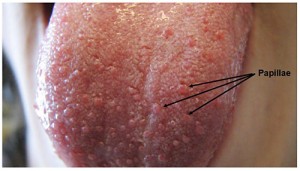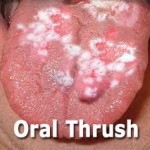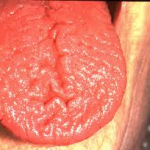Sore tongue medically known as stomatitis is a very common symptom. Most of the doctors routinely prescribe B-complex tablets, terming it B-complex deficiency. In fact in many instances it is not so. Painful tongue is a common problem. Many of us experience a sore tongue from time to time. But what should you do about it if it affects you.
 The tiny projections that cover the surface of the tongue are called “papillae”. If you could examine them under a microscope you would see that the papillae are tiny folds of the surface of the tongue. Each is surrounded by a trench, rather like a castle surrounded by a moat. In each trench, there are several clusters of cells sensitive to various tastes; these are the actual taste buds. If we did not have any papillae, the tongue would be very smooth and slippery, and not very efficient at moving food round the mouth. Some animals (such as cats) have very prominent papillae, which is why their tongues feel so rasping.
The tiny projections that cover the surface of the tongue are called “papillae”. If you could examine them under a microscope you would see that the papillae are tiny folds of the surface of the tongue. Each is surrounded by a trench, rather like a castle surrounded by a moat. In each trench, there are several clusters of cells sensitive to various tastes; these are the actual taste buds. If we did not have any papillae, the tongue would be very smooth and slippery, and not very efficient at moving food round the mouth. Some animals (such as cats) have very prominent papillae, which is why their tongues feel so rasping.
Causes of a sore tongue
 Inflammation of the tongue is medically known as glossitis. Pain in the tongue is known as glossodynia. Because soreness or painful lesions on the tongue can have a wide variety of causes, treatment and outlook depend upon the particular condition that is responsible.
Inflammation of the tongue is medically known as glossitis. Pain in the tongue is known as glossodynia. Because soreness or painful lesions on the tongue can have a wide variety of causes, treatment and outlook depend upon the particular condition that is responsible.
A number of different conditions can result in pain and/or the presence of abnormalities or sores on the tongue. Problems with the tongue can result from:
·      Infections – Oral Thrush
A cracked tongue may indicate an oral yeast infection, or oral thrush. Oral thrush is caused by the accumulation of the candida fungus in the lining of your mouth. In addition to cracks, symptoms of oral thrush include pain, loss of taste and lesions on the tongue and other areas in the mouth. A weak immune system, diabetes, cancer and vaginal yeast infections are all causes of oral thrush, according to MayoClinic.com. Your physician may recommend antifungal medications and other treatments based on the cause of your condition.
- tumors,
- chronic medical conditions – Medical conditions, including diabetes and anemia, can have a sore tongue as a symptom.
-
Burning tongue syndrome – Some post-menopausal women develop this syndrome, which makes the tongue feel as if it has been burned.
- Smoking – Smoking excessively can irritate your tongue and make it sore.
- trauma – Accidentally biting your tongue or scalding it on something straight out of the oven can result in a sore tongue until the damage heals. Grinding or clenching the teeth can also irritate the sides of the tongue and cause it to become painful. Irregular teeth or plaque at back of teeth may be rubbing against the tongue while eating or drinking. When someone is anxious they may unconsciously be biting the tongue or rubbing their tongue against the teeth too. Passionate kissing may be responsible if your tongue is coming into contact with your partner’s teeth.
- Enlarged papillae – If one or more of your taste buds becomes inflamed or irritated, it can swell and form a painful bump on your tongue.
- Canker sores – Many people will develop these mouth ulcers on the tongue at some point in their life. The cause is unknown, although they can be worse during periods of heightened stress.
- toxins.
- Oral cancer – Though most sore tongues are nothing to worry about, you should consult a doctor if you have a lump or sore on your tongue that doesn’t go away within a week or two. Many oral cancers don’t hurt in the early stages, so don’t assume a lack of pain means nothing is wrong.
- Disturbances to normal bacterial flora and overgrowth of fungus – When one eats too much sugar, it causes an overgrowth of a yeast called Candida. It makes the tongue very sore and raw. The medical term for this is called “Oral Thrush” which is yeast overgrowth.
- B-Complex deficiency – Your sore, cracked tongue may also result from a deficiency in biotin, a B vitamin noted for its role in energy metabolism and fat synthesis. Other symptoms of deficiency include pale or gray skin, muscle pain, weakness, fatigue and dry skin, according to the Better Health Channel website. To add more biotin to your diet, the site suggests you eat chicken, egg yolks, cauliflower and mushrooms. Prior to altering your diet, consult your physician to determine proper diagnosis.
- Irritation due to chemical imbalance in tongue.
- In some cases, pain that originates in other sources (such as cardiac angina or problems with the teeth and/or jaws) can be experienced in the tongue, even though the tongue itself is normal. This is known as referred pain.
